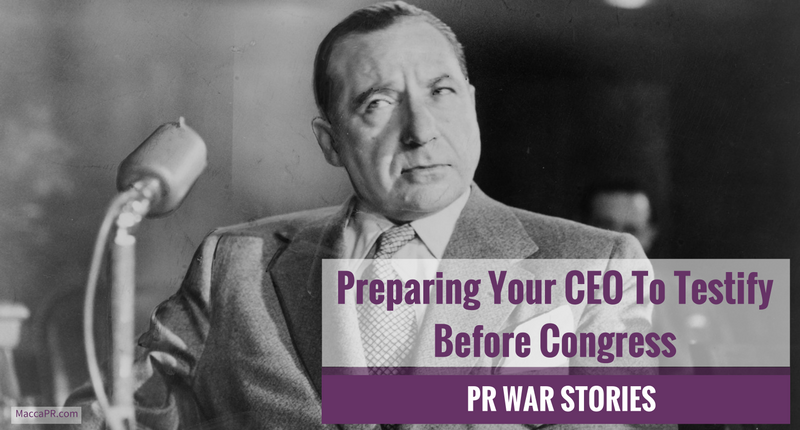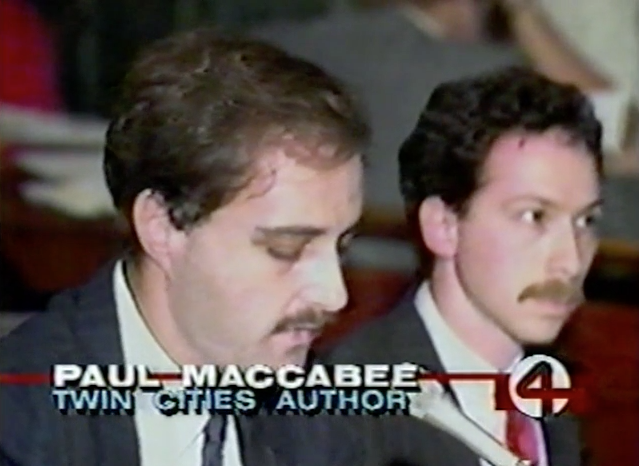PR War Stories: Preparing Your CEO to Testify Before Congress

Which would your CEO rather do: testify before hostile members of Congress under oath or be hung by their toes over a blazing Hibachi grill?
Yes, testifying before Congress has never been a CEO’s favorite diversion. Most recently, we witnessed the ordeal endured by Heather Bresch, CEO of EpiPen manufacturer Mylan (pictured at left), when she testified before the House Oversight and Government Reform Committee in an attempt to explain the 500 percent price increase for its life-saving medical device.
Or who can forget the gaunt, sweating and desperately obfuscating tobacco and oil company executives who have faced Congressional inquisitions? Exhibit A: British Petroleum’s former CEO Tony “I’d Like My Life Back” Hayward, who was relentlessly grilled on Capital Hill after the lethal Deepwater Horizon explosion led to the worst oil spill in U.S. history.
So how can you as a corporate communications or PR professional prepare your CEO for testimony before Congress, where they are under oath, on-camera and facing politicians with subpoena power? You can start by learning the initial missteps – and ultimate success – of yours truly, when I testified against the Federal Bureau of Investigation (FBI) in Congress during my years as an investigative journalist (below right).

PR Lessons From My Experience Testifying Before Congress
While researching the FBI’s battle against 1930s gangsters for my crime history book, “John Dillinger
Slept Here,” I filed dozens of Freedom of Information Act requests with the FBI to obtain copies of long-secret files on bankrobbers John Dillinger, Alvin “Creepy” Karpis and “Babyface” Nelson, along with local hoodlums like Minneapolis godfather Isadore “Kid Cann” Blumenfeld.
Being a publicist at heart, I also persuaded the media to publicize the FBI’s reluctance to crack open their crime files, which led to a surprise phone call from a staff member for Vermont Sen. Pat Leahy. Would I be willing to testify about the FBI’s foot-dragging before the Subcommittee on Technology and the Law in Washington D.C.? Oh, yes.
With visions in my head of the 1954 drama between U.S. Army counsel Joseph Welch and U.S. Sen. Joseph McCarthy during the Army-McCarthy hearings (“At long last, have you left no sense of human decency, sir?” Welch demanded of Sen. McCarthy, thus destroying the anti-Communist crusader’s reputation), I feverishly prepared dramatic remarks that savagely criticized the Bureau’s refusal to both release and agree to a waiver of fees for FBI files on Minnesota organized crime figures.
My script combined Emile Zola’s fury over France’s notorious Dreyfus Affair (“J’Accuse!”) with the shoe-pounding rage of Jack Nicholson in the film, “A Few Good Men” (I channeled his climactic outburst, “You can’t handle the truth!”). My words seethed with self-righteousness, as if I single-handedly were throwing myself against the walls of the J. Edgar Hoover Building. I half expected that my testimony would climax with the entire gallery exploding into applause, as they did for Al
Pacino’s character at the finale of the movie, “Scent of a Woman.” I sent an advance copy to Sen. Leahy’s team in Washington.
Within hours of receiving that draft testimony, Sen. Leahy’s staffer phoned me and – how shall I say it – expressed dismay at the tone of my proposed remarks. More than two decades later, my handwritten notes from that phone call still vibrate with their concern. My testimony’s word choices were too loaded, and my tone too flip for a Congressional hearing, he warned. The senator’s staff urged me to be less judgmental about the FBI in my testimony – that was the senators’ role, not mine. Instead, they recommended that I lay out the facts with calm and dispassion. Be respectful – even solemn – they advised, when addressing the senators . . . you are in their house, on their turf. Never forget that this is a public hearing – don’t appear to challenge these senators in front of TV cameras.
A Coda: I took the advice of Sen. Leahy’s staff and days later, delivered my revised testimony in a hearing room inside the Dirksen Senate Office Building with an air of deep and somber gravity. The hearing went well and even my likeliest adversary – a staunch defender of the FBI, Utah Sen. Orrin Hatch – treated me graciously in return.
Public Relations Lessons
So what can you as a corporate communications professional learn from my naivete’ as a young journalist facing Congress?
- When testifying before Congress – or in fact before any city, state or county hearing – be sensitive to the agendas and preferred story narratives of each legislator questioning you (whether they be friendly or unfriendly to your position). You may feel like you’re representing yourself – but in fact, you are more likely serving as human evidence, being entered into the record by an advocate or opponent of your or your company’s views.
- Anticipate in advance the questions that will be asked of you. Experienced trial lawyers know never to ask a witness a question they don’t already know the answer to. Similarly, the rule for executives is – never go into testimony without knowing the toughest questions you might be asked. Sen. Leahy’s staff warned me that hostile senators might challenge me with, “Why should American taxpayers foot this bill for your crime research?” and “Why should you be allowed to ‘gob up the work’ of the FBI?”
- Remember that tone (from body language to the style of the words you use while testifying) is everything. Few who saw it could forget the body language of gangster Frank Costello (featured in this post’s header image) during his Kefauver Committee crime commission testimony. TV cameras captured the mobster’s anxious hands nervously twisting and wiping his face with a handkerchief – a silent admission of what appeared to be a guilty conscience.
- Avoid jargon – legal, medical or otherwise. An executive’s understandable caution about testifying can lead many to embrace obfuscating language. As political operative James Carville might say, “Keep It Simple, Stupid.”
A Side Note: Presidential historian Doris Kearns Goodwin recently interviewed President Obama for Vanity Fair magazine. She reminded him that president Franklin Delano Roosevelt would draft furious speeches that called out his enemies by name. “And then he would do Draft Two, Draft Three, Draft Four,” noted Goodwin, “and one of his young speechwriters said, “Oh, my God, you can’t say this.” And then, by Draft Six, the offending phrase was gone.” At that, Obama admits that he too prepares intemperate speeches “all the time . . . a full rant.” Added Obama “And then I’ll crumple it up.”
Take the advice of these presidents, and recognize that your company leadership’s first – and perhaps most defensive – draft of remarks may need to give way to a more nuanced, respectful version. The truth? I think your CEO can handle that truth.
See also our blog post, “Apology Accepted: 11 Tips for Responding to a Crisis”
Image Source(s): Boston Globe / Annie Leibovitz

